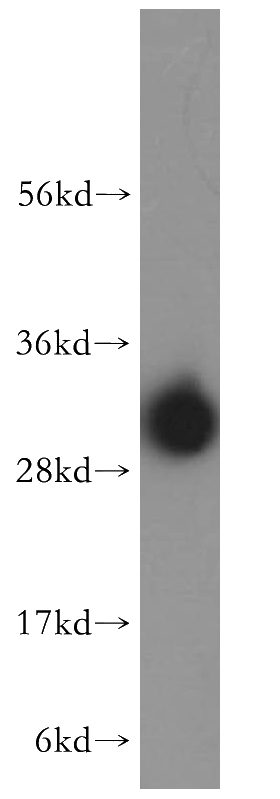-
Product Name
MTERF antibody
- Documents
-
Description
MTERF Rabbit Polyclonal antibody. Positive WB detected in HeLa cells, Jurkat cells. Observed molecular weight by Western-blot: 31kd
-
Tested applications
ELISA, WB
-
Species reactivity
Human,Mouse,Rat; other species not tested.
-
Alternative names
MTERF antibody; MTERF1 antibody
-
Isotype
Rabbit IgG
-
Preparation
This antibody was obtained by immunization of MTERF recombinant protein (Accession Number: XM_006716126). Purification method: Antigen affinity purified.
-
Clonality
Polyclonal
-
Formulation
PBS with 0.02% sodium azide and 50% glycerol pH 7.3.
-
Storage instructions
Store at -20℃. DO NOT ALIQUOT
-
Applications
Recommended Dilution:
WB: 1:500-1:5000
-
Validations

HeLa cells were subjected to SDS PAGE followed by western blot with Catalog No:112769(MTERF antibody) at dilution of 1:400
-
Background
Mitochondrial transcription termination factor (MTERF)also named as Mterf1 is a 399 amino acid protein, which localizes in the mitochondrion and belongs to the mTERF family. MTERF contains three leucine zippers that form a three-stranded coiled-coil that binds to DNA. It has been suggested that only the phosphorylated form of MTERF has transcription termination activity. MTERF plays a central role in the control of mitochondrial rRNA and mRNA synthesis. MTERFD1 is also thought to act as a mitochondrial transcription regulator and is expressed as two isoforms produced by alternative splicing.Using DNA affinity chromatography, a fraction called MTERF was found to be associated with foot-printing capacity, and this contained two polypeptides of 34 and 31 kDa. Moreover, termination-promoting activity appears to reside in the 34-kDa protein. (PMID:7681833).
-
References
- Geng J, Sun X, Wang P. Kinases Mst1 and Mst2 positively regulate phagocytic induction of reactive oxygen species and bactericidal activity. Nature immunology. 16(11):1142-52. 2015.
Related Products / Services
Please note: All products are "FOR RESEARCH USE ONLY AND ARE NOT INTENDED FOR DIAGNOSTIC OR THERAPEUTIC USE"
